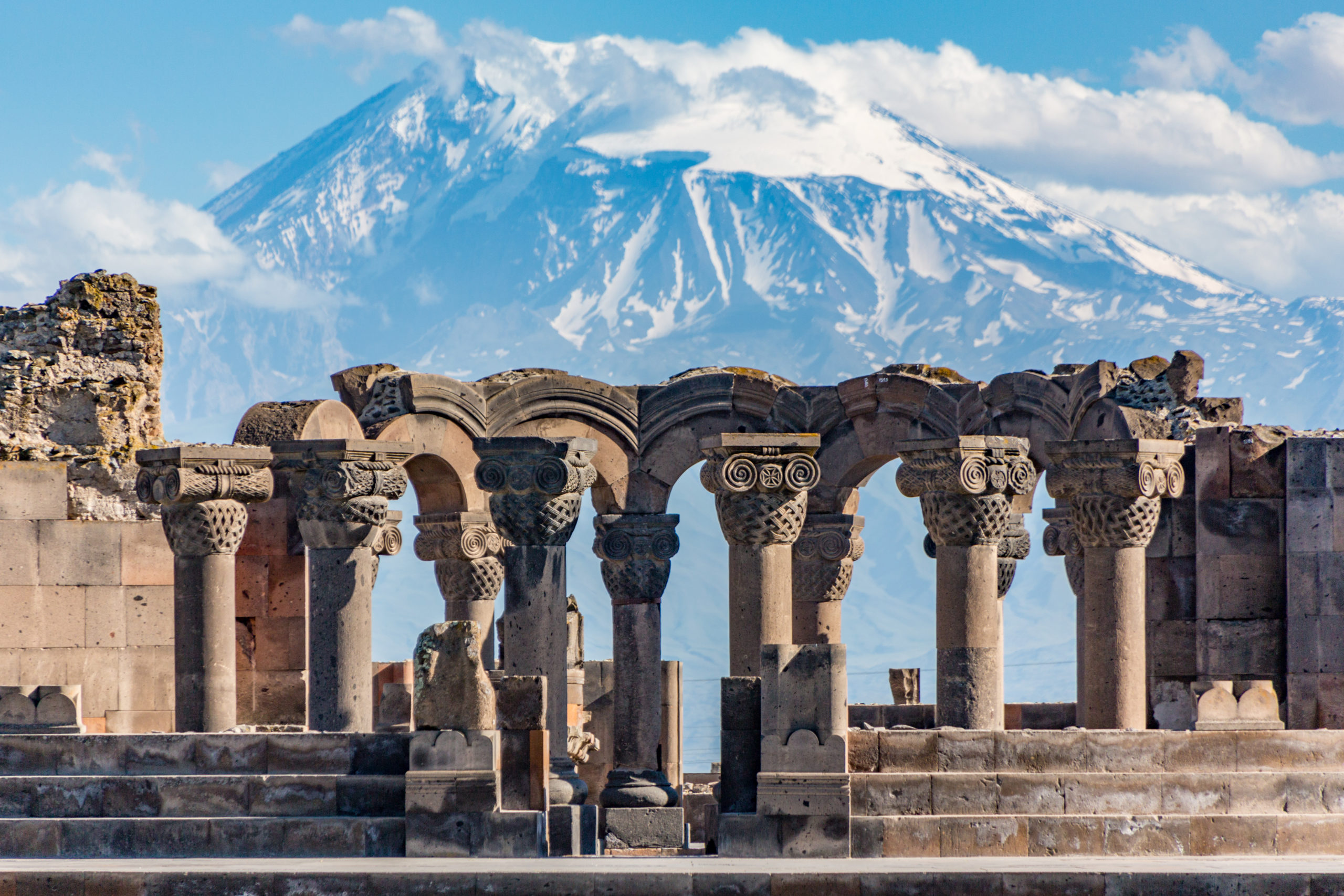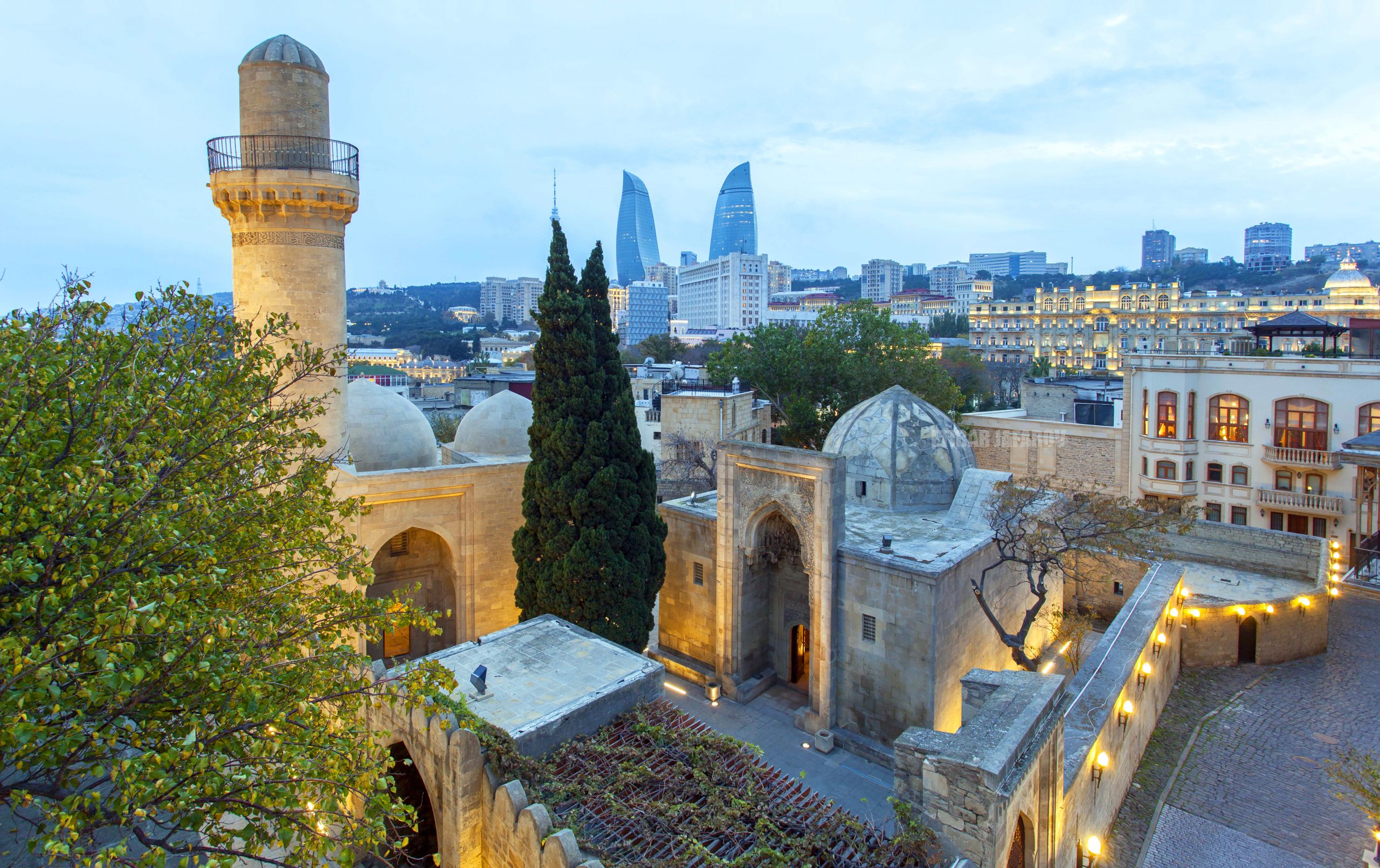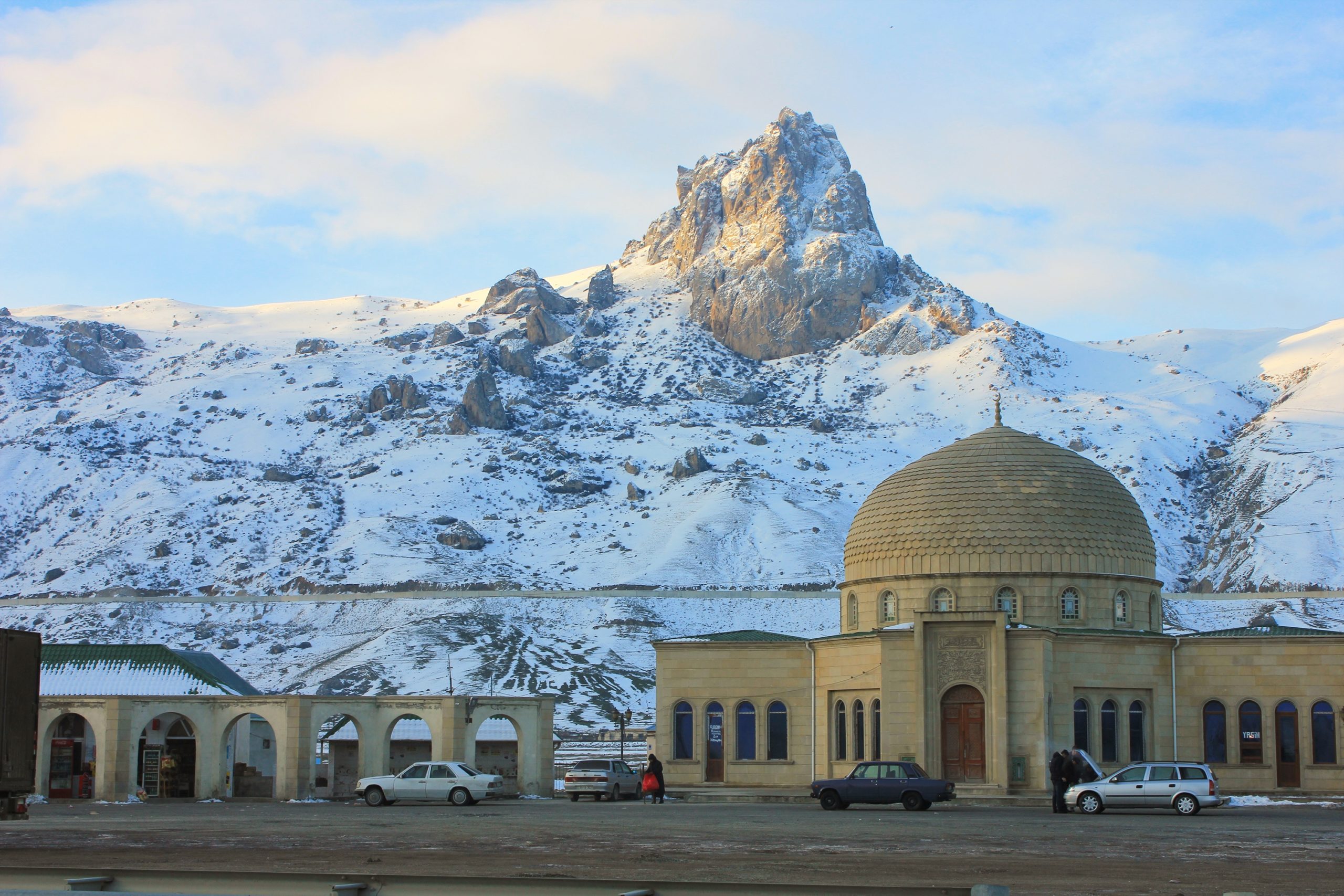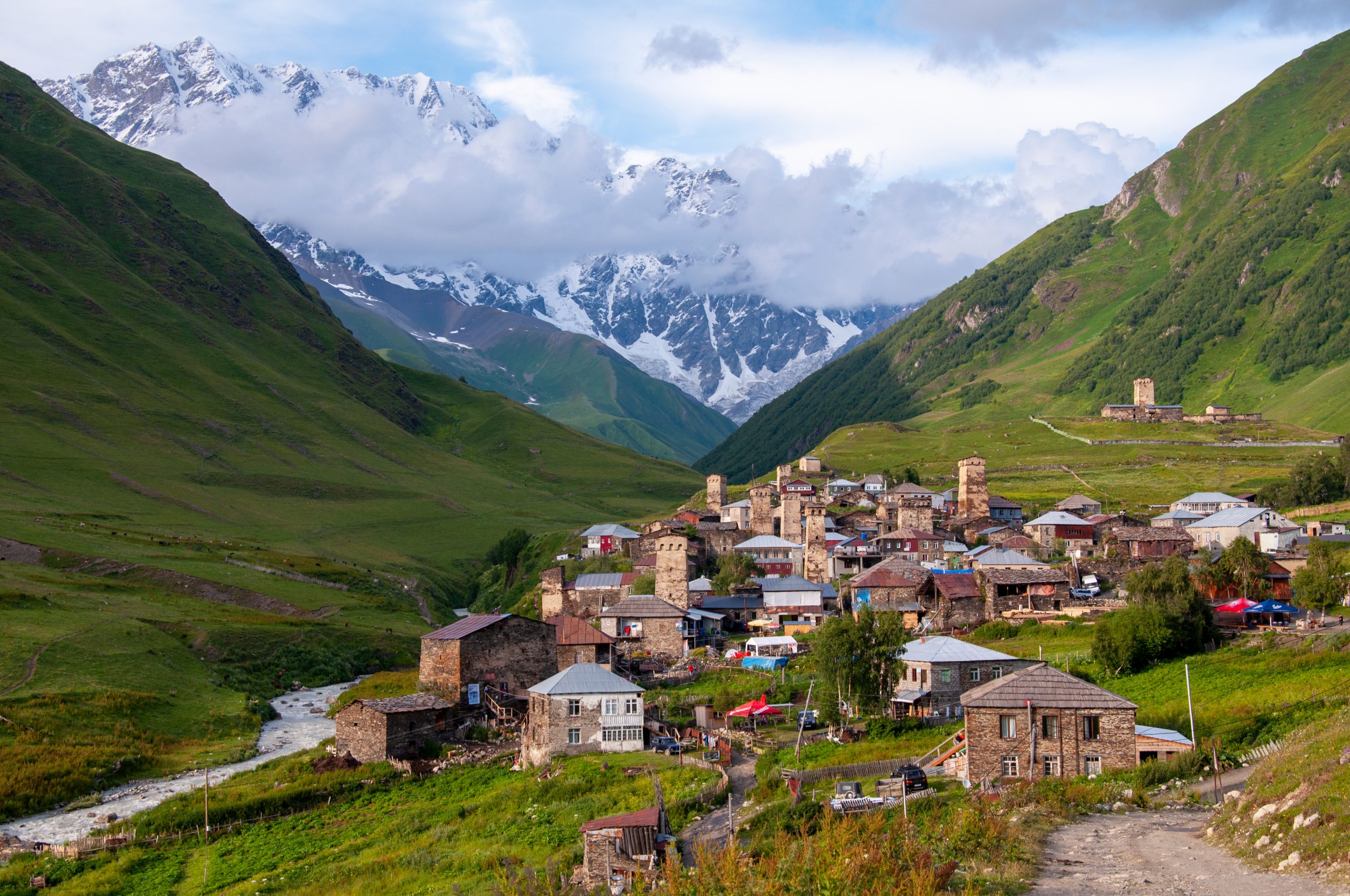Strategic Analysis Caucasus Brief
Bi-weekly review (19.12. 2022 – 01. 01. 2023)
Tomáš Baranec
Armenia

Ruins of the Zvartnos temple in Yerevan, Armenia. Photo: MindStorm / Shutterstock.com
Armenia increasingly critical towards Russia
As the near-total closure of the only road in and out of the de facto Nagorno-Karabakh entered its third week, the precarious humanitarian situation in the region led to increasing criticism of Russia from top Armenian representatives. At a meeting of the Armenian government on December 22, Armenian Prime Minister Nikol Pashinyan accused the Russian peacekeepers of not fulfilling their obligations, as stipulated in the tripartite statement of November 9, 2020, which stipulates the guarantee of unhindered movement of citizens and goods along the Lachin corridor.
Pashinyan argued that despite the illegal actions of Azerbaijan, the situation remains unchanged due to the lack of enforcement by the Russian peacekeepers. He also expressed his belief that the key task of the peacekeepers is to prevent illegal actions and that they are currently failing in this regard.
The Armenian PM continued similarly during his meeting with Russian president Vladimir Putin, which took place in Saint Petersburg on December 27. Pashinyan said that“…despite the agreement, Lachin Corridor is not under the control of Russian peacekeepers, and I would like to discuss that situation and the available variants”.
Two days later, Pashinyan further slammed Russian peacekeepers, calling for the involvement of the UN. “If Russia is unable to ensure stability and security in Nagorno-Karabakh for objective or subjective reasons, then it should initiate a discussion in the UN Security Council to grant the Russian military contingent a UN Security Council mandate.”
According to Pashinyan, such a question also arose because the closure of the Lachin Corridor is not the first case of an Azerbaijani invasion under the responsibility of the Russian peacekeeping force. “It was preceded by the events of Khtsaberd [Çaylaqqala in Azerbaijani] and Parukh [Farukh in Azerbaijani],” he added.
The Secretary of Armenia’s Security Council, Armen Grigoryan, went even further when he claimed that the crisis was a result of efforts from Russia and Belarus to push Armenia to join the Union State that already binds those two former Soviet republics. “Armenia is under pressure in this regard, but when our democratic structures resist, we receive a different type of pressure — of the military variety,” he claimed in an interview with public television.‘
In response to the Armenian Prime Minister’s statement, Dmitry Peskov, the Press Secretary of the President of the Russian Federation, noted that Russian peacekeepers in Nagorno-Karabakh are doing everything possible to ensure order and tranquillity, acting by the spirit and letter of the relevant agreements.
Maria Zakharova, the spokeswoman of the Ministry of Foreign Affairs of Russia, added that the Russian peacekeepers are fulfilling their mission and have successfully settled the situation before the current crisis. In response to Pashinyan’s accusations. Zakharova stated that such an attitude towards the Russian peacekeepers is unacceptable.
Sources:
- GAVIN Gabriel, Eurasianet.org, Armenians turn fire toward Russia as Nagorno-Karabakh blockade enters the third week, https://eurasianet.org/armenians-turn-fire-toward-russia-as-nagorno-karabakh-blockade-enters-third-week
- Caucasus Watch, Exchange of Accusations Between Armenia and Russia Over Blockade of Lachin Corridor, https://caucasuswatch.de/news/6795.html
- Caucasus Watch, Nikol Pashinyan: ’Lachin Corridor is Not Under Control of Russian Peacekeeper’”, https://caucasuswatch.de/news/6828.html
- JAM News,”’ It’s unacceptable for the peacekeepers to be silent witnesses’ – Pashinyan”, https://jam-news.net/pashinyan-on-the-mandate-of-russian-peacekeepers/
Aliyev says Yerevan is „historically“ Azerbaijani
Azerbaijani President Ilham Aliyev has appeared to lay claim to modern-day Armenia, reported OC Media. “Western Azerbaijan [Armenia] is our historical land; this is confirmed by many historical documents, historical maps, and our history”, Aliyev said on December 24 in a wide-ranging speech to the Community of West Azerbaijanis on his 61st birthday.
“The 20th century brought great tragedies for our people in this regard. In one of its first decisions, the newly established Azerbaijan People’s Republic in 1918 practically donated our historical city — Yerevan — to Armenia. It was an unforgivable step, it was treason, and it was a crime. We all know this very well, and our people should know it too. We should never distort our history”, Aliyev said.
“Western Azerbaijan” is an irredentist concept used by the Azerbaijani authorities to lay claim to the territory of modern-day Armenia. Over the years, Aliyev has frequently attacked the leadership of the first Azerbaijani Republic, to whom the opposition Musavat Party traces its roots.
Armenia’s Foreign Ministry responded to Aliyev’s claims by claiming that Baku’s provocations against the people of de facto Nagorno Karabakh are part of Baku’s policy of ethnic cleansing. Ministry said that during the establishment of the first Republic of Armenia and in the period preceding it, Yerevan was never under the control of Azerbaijani or Turkish forces, so it could not be transferred to the Armenians by any arbitrary decision made by them.
Sources:
- FABBRO Robin, OC Media, „Aliyev says Yerevan ‘historically’ Azerbaijani“, https://oc-media.org/aliyev-says-yerevan-historically-azerbaijani/
- Asbarez.az, „Armenia Responds to Aliyev’s Claim of Yerevan Being Part of Azerbaijan, Warns of Ethnic Cleansing“, https://asbarez.com/armenia-responds-to-aliyevs-claim-of-yerevan-as-being-part-of-azerbaijan-warns-of-ethnic-cleansing/

Old City in Baku. Photo: MindStorm / Shutterstock.com
Major Azerbaijani entrepreneur sentenced to 14 years in prison
On December 28, the Baku Court of Serious Crimes sentenced Rasim Mammadov, the former head of the Baku Steel Company, to 14 years in prison with confiscation of his property. According to the court’s verdict, Mammadov will serve his sentence in a strict-regime penitentiary.
Mammadov was accused of committing economic crimes under the Articles: 179.4 (appropriation and embezzlement on an especially large scale); 193.3.2 (sham entrepreneurship, with receipt of income on an immense scale); 308.2 (abuse of official powers that entailed grave consequences) and 313 (official forgery) of the Criminal Code.
According to the report, Mammadov deliberately used his powers contrary to the interests of the service and embezzled EUR 7.2 million from the funds transferred to the enterprise through formalized sales and wasted EUR 23.1 million worth of manufactured goods. With these actions, it was determined that “Baku Steel Company” LLC caused significant damage to its financial resources and continuous activity. It seized a large amount of money from various people by deception and abuse of trust and committed repeated fraudulent acts.
However, Mammadov pleaded not guilty and said the accusation was fabricated. According to him, it is absurd to be accused of embezzling the funds of his plant. He emphasized that in 2011, in connection with “Baku Steel Company”, the Head of the President’s administration Ramiz Mehdiyev and the President’s personal security service chief met him for a discussion. The gentlemen had a discussion with Ayyubov and agreed on certain issues. Later, the revenues of the plant were divided based on that agreement.
Importantly, Baku Steel Company, led by Rasim Mammadov, was the country’s first large steelmaking enterprise, which started its operation in 2001. The company’s annual production capacity for steel production was one million tons. In the last few years, articles have been published in the local media about this company’s monopolistic position, taking over the property of other companies and using its position of closeness to several high-ranking officials to gain an advantage in the market.
Sources:
- Caucasus Watch, „Major Azerbaijani Entrepreneur Sentenced to 14 Years in Prison“, https://caucasuswatch.de/news/6846.html
- Turan.az, „Former owner of Baku steel company sentenced to 14 years in prison“, https://www.turan.az/ext/news/2022/12/free/Social/en/13317.htm
- Az.24.saat, “It turns out that if they accused me of treason, you wouldn’t investigate it either”, https://eng.az24saat.org/2022/12/26/it-turns-out-that-if-they-accused-me-of-treason-you-wouldnt-investigate-it-either/
Head of Nakhchivan resigns after 27 years in power
Vasif Talibov, chair of the Supreme Assembly of the Nakhchivan Autonomous Republic (NAR), has resigned after 27 years as head of the republic. On December 21, Talibov submitted a request to Nakhchivan’s parliament through its deputy chair, Azer Zeynalov, asking that he be permitted to resign from his position, citing his health.
Following the vote, Zeynalov concluded the session and announced that “from now on, the instructions and recommendations of the President of Azerbaijan, Ilham Aliyev, will be our main direction of action’”. “We will remain loyal to Heydar Aliyev’s political line, which was successfully continued by the head of state [Ilham Aliyev].”
Turan.az writes that the recent developments around the Autonomous Republic and the arrests of high-ranking officials give reason to believe that Talibov resigned for other reasons. Aydin Huseynov, a deputy from the “Azerbaijan” Party, noted that Nakhchivan has great economic potential. At the same time, Nakhchivan is considered a vulnerable region for lack of land connection with the rest of Azerbaijan. “We can say with optimism that Nakhchivan’s economic potential will develop further within the framework of the country’s overall economic potential.”
According to the deputy, the current processes in Nakhchivan, especially in the financial and customs system, are not so encouraging. “I think that the chairman of the Majlis to be elected in the NAR will quickly correct mistakes made by his predecessor.
Political commentator Nasimi Mammadli said that Vasif Talibov is actually one of the most political old-timers who came to power in Nakhchivan after Azerbaijan gained independence. “His rule in Nakhchivan lasted about 27 years. This power took the form not of civil-state relations but rather of khan-tribal relations. It was no coincidence that he was called the Khan of Nakhchivan.”
According to the political scientist, there has also been an authoritarian regime in Azerbaijan for many years. “But it is impossible to compare it with Nakhchivan. There was such a tough authoritarian regime in Nakhchivan that thousands of people fled to fraternal Turkey or to Baku. At the same time, huge amounts of public funds were appropriated.”
The expert believes that Talibov did not resign voluntarily. “He was forced to resign as a result of the decision of the head of state, apparently for quite serious violations. Apparently, the geopolitical situation that developed after the Second Karabakh War also plays a certain role here. The regime in Nakhchivan was closely linked to the regimes in Iran and Russia. Perhaps the closer rapprochement of Azerbaijan and Turkey also plays a role here.”
Siyavush Novruzov, a member of parliament from the ruling New Azerbaijan Party, also said Talibov had resigned at the request of Azerbaijani President Ilham Aliyev.
Sources:
- AGHAYEV Ismi, OC Media, “Head of Nakhchivan resigns after 27 years in power“, https://oc-media.org/head-of-nakhchivan-resigns-after-27-years-in-power/
- Turan.az, Vasif Talıbov, „Expert believes that Vasif Talibov did not resign voluntarily“, https://www.turan.az/ext/news/2022/12/free/Social/en/13094.htm
Georgia amends broadcast law despite media watchdog warnings
Despite the call of civil society organizations, the Parliament of Georgia approved the amendments to the Law on Broadcasting by 81 votes in a special session held on December 22, informed Civil.ge.
According to the Georgian Dream MPs, the changes initiated on September 7, 2022, aim to bring Georgian legislation on audiovisual media services into compliance with the relevant directive of the European Union. However, the means of supervision of media content on the part of the Communications Commission are expanding.
Simultaneously, the procedure for resolving defamation disputes is changed, and a “right to respond” clause is added, allowing citizens who believe that a particular media outlet has spread false and defamatory information about them to file a complaint directly with the Communications Commission. Previously, in similar cases, citizens petitioned the Charter of Journalistic Ethics or the court. Furthermore, whether or not the commission’s decisions are appealed in court, they will be effective immediately.
A media watchdog, Reporters Without Borders (RSF), on December 26 reacted to the amendments to the Law of Georgia on Broadcasting adopted by the Parliament of Georgia a few days ago. “RSB is alarmed by the risks the amendments pose to freedom of expression” the watchdog stated on Twitter.
A day before the adoption of the amendments, on December 21, the Media Advocacy Coalition, a CSO working on the topic of media, once again stated that the process of introducing amendments to the Law of Georgia on Broadcasting “was carried out hastily, without sharing the opinions of people involved in the field and without assessing the risks, which creates a threat of deterioration of the already difficult media environment”.
CSOs also mentioned the Georgian Dream’s argument about the implementation of the European Directive as a reason for the changes, emphasizing that the European Union does not tell countries how to change their legislation. “The most important thing for countries to do to fulfil the directive is to achieve the goal set by it. [This approach] enables countries to consider the circumstances in the directive’s implementation and choose a path that does not harm the field.”
Furthermore, “the European Union has postponed the process until May 31, 2023, [for Georgia] to fulfil this obligation and work on the amendments to the Law of Broadcasting,” according to the CSOs. Considering the dangers of Georgia’s media environment, the majority of TV broadcasters and civil society organizations worked on an alternative version of the draft law, which was presented to Parliament by MP Tamar Kordzaia, “but they did not take the proposal into consideration,” according to the CSOs.
Sources:
- Civil.ge, „Parliament Adopts Amendments to the Law on Broadcasting“, https://civil.ge/archives/519851
- Civil.ge, „RSF Reacts to Amendments on Broadcasting Law“, https://civil.ge/archives/520104
People’s Power Movement Proposes a law on foreign agents
The People’s Power Movement, which is part of the parliamentary majority, will initiate a draft law in January 2023 that would affect the activities of foreign-funded non-governmental organizations in Georgia.
The Anti-Western party announced on December 29 at a media briefing that it will register two draft laws in the Parliament in January 2023. According to the MPs representing People Power, the draft laws will envisage creating a registry for “agents of foreign influence” and “regulating the dissemination of fake news by media.” People Power says the draft laws will be based on “the best Western practices.”
“The draft law prepared by us will make a significant contribution to ensuring the national security of Georgia from various points of view,” said Guram Macharashvili, MP of People’s Power. The party plans to introduce legislation that will make it obligatory for “all relevant CSOs and other entities, who receive funds from foreign sources and aim to influence decision-making on public matters, or the formation of public opinion,” to register in the registry of agents of foreign influence.
According to Macharashvili “the definition of an agent of foreign influence will be introduced, and the relevant entities will be obliged to declare their financial income and expenses fully.”
People Power is a spin-off faction consisting of the former Georgian Dream MPs, who continue to support the government. GD leader Irakli Kobakhidze argued in October that the parties have “no significant differences” in values but differ in the ways they choose to frame certain issues.
Sources:
- Civil.ge, “Anti-Western ‘People Power’ Propose ‘Foreign Agent‘ Laws Targeting CSOs, Media“, https://civil.ge/archives/520491
- Interpressnews, „According to the People’s Power draft law, a register of agents of foreign influence should be created, in which registration will be mandatory for all NGOs and entities that are financed from foreign sources“, https://www.interpressnews.ge/en/article/123254-according-to-the-peoples-power-draft-law-a-register-of-agents-of-foreign-influence-should-be-created-in-which-registration-will-be-mandatory-for-all-ngos-and-entities-that-are-financed-from-foreign-sources/



Contact us